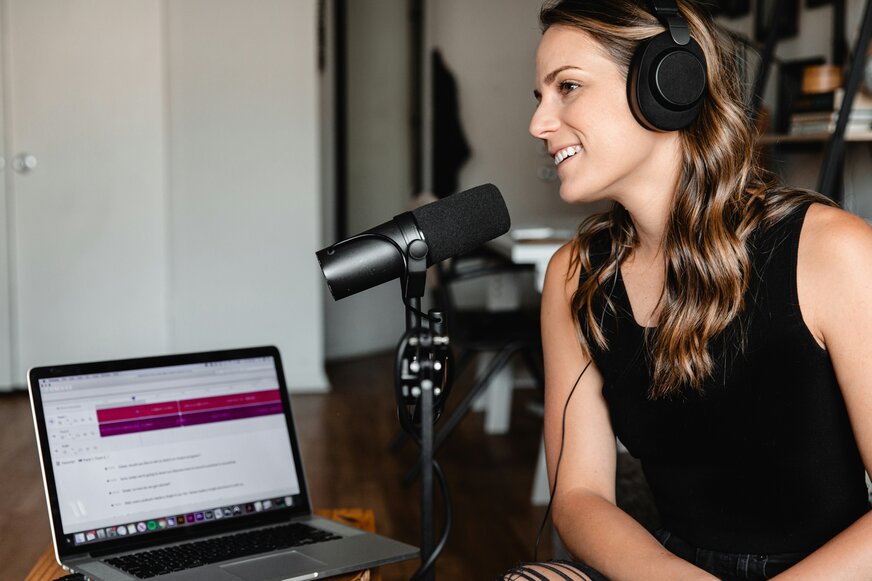Podcasting has quickly become one of the most exciting ways to share your voice and creativity with the world. If you’ve ever thought about starting your own podcast, you’re in the right place. In this guide, I’ll walk you through the process, using my personal experience from Creative Space, now in its third season, to show how easy (and rewarding) it can be!
Why Start a Podcast?
There’s a magic to podcasting that goes beyond just building an audience. When I started Creative Space, my goal was to connect with fellow artists and makers of all kinds. What I didn’t expect was the incredible personal growth that came with it. Podcasting helped me find my voice, become more disciplined, and even gain confidence in my interviewing skills.
Whether you want to explore your passions, build your communication skills, or simply share stories, starting a podcast can help you grow in ways you might not expect. Plus, it’s a fantastic way to connect with people who share your interests.
The Benefits of Podcasting: More Than Just Growing an Audience
While growing an audience is one benefit of podcasting, there are others that matter just as much—if not more. Here are a few personal growth benefits I’ve discovered through Creative Space:
- Finding Your Voice: Over time, you develop a clearer sense of who you are and what you stand for.
- Building Self-Discipline: Sticking to a release schedule helped me stay consistent in my creative work.
- Boosting Confidence: With each episode, I became more comfortable sharing my thoughts and ideas.
- Connecting with Others: I’ve had the chance to interview so many inspiring people, and those connections have enriched my creative journey.
5 Simple Steps to Start Your Own Podcast
So, how do you start a podcast? Here’s a step-by-step breakdown based on my journey with Creative Space:
1. Choose a Topic You’re Passionate About
Your podcast should revolve around something that excites you. When I started Creative Space, I knew I wanted to talk about creativity, but I made sure to focus on what would resonate most with my audience: interviews with artists, writers, and creatives.
Think about what you love. Are you into Philly sports? Local music? Pop culture? A niche topic helps build a dedicated following.
2. Plan Your Show
Before you record, it’s important to plan the structure of your show. This includes deciding on:
- Format: Will it be solo, interviews, or co-hosted?
- Length: I started with hour-long episodes, given the podcast was initially only interviews, but you can experiment with different lengths.
- Structure: A clear intro, main content section, and outro to keep listeners engaged.
For Creative Space, I focused on interviews with creatives, and each episode started off with a brief intro before diving into the conversation. I also created podcast intro and outro music to brand the podcast from a sonic perspective.
3. Record Your Episode
Good news: you don’t need expensive equipment to start. My first episodes of Creative Space were recorded on a smartphone! As I progressed, I invested in a microphone, but the key is to get started. Recording in a quiet space will make a big difference in sound quality. All the mixing and mastering in the world can’t edit out loud background noise.
4. Edit Your Podcast
Editing can seem intimidating, but tools like Audacity (free) or GarageBand (for Mac users) make it easy. I learned to cut out long pauses and add intro music to Creative Space. Start with the basics—over time, you’ll get more comfortable with the process.
5. Choosing a Hosting Provider
Once your episode is ready, you’ll need a podcast hosting provider to store your audio files and distribute them to platforms like Spotify, Apple Podcasts, and Google Podcasts. Here’s how to choose the right one for you:
- Ease of Use: Look for a host with a simple dashboard and easy setup.
- Distribution: Ensure your host will distribute your episodes to major podcast directories.
- Analytics: Choose a host that offers stats like downloads, listener demographics, and platforms.
- Cost: Some providers offer free plans with limited features, while others charge a monthly fee.
Popular Hosting Providers:
- Spotify for Podcasters: Free and easy to use. This is a great option for beginners on a budget.
- Buzzsprout: Offers free and paid plans with detailed analytics, access to special features like mastering, and great customer support. I’ve been a happy Buzzsprout customer since starting Creative Space and I highly recommend their service. You can get a discount on your hosting plan at this link.
- Podbean: Offers free and paid plans, plus built-in monetization features.
After choosing a host, you’ll be ready to distribute your podcast and share it with the world.
Promoting Your Podcast
Growing your podcast takes time and effort. Here’s how I’ve promoted Creative Space over the years:
- Social Media: I regularly share episodes on Instagram and LinkedIn, which helps grow my audience.
- Collaborations: Featuring guests helps introduce the podcast to new listeners.
- Consistency: One of the biggest lessons I’ve learned is to stick to a schedule. Whether it’s weekly or bi-weekly, regular episodes keep your audience engaged.
Common Mistakes to Avoid When Starting a Podcast
As exciting as starting a podcast can be, there are a few common mistakes that new podcasters often make. I’ve faced some of these myself while building Creative Space, and I want to help you avoid them!
1. Overthinking the Equipment
Many people believe they need expensive microphones, mixers, and studio setups to start a podcast. The truth is, you can begin with just your smartphone and free software. Don’t let the fear of not having the best gear stop you from recording. You can always upgrade your equipment later as you grow. The most important thing is your message, your passion, and your content!
2. Inconsistent Posting Schedule
This is one of the biggest mistakes new podcasters make—starting strong and then missing weeks or even months between episodes. (I am guilty here!) Consistency is key. I’ve found that even if life gets busy, sticking to a release schedule helps keep your audience engaged and coming back for more.
3. Neglecting Episode Planning
It’s tempting to hit record and talk, but a well-structured episode keeps listeners hooked. Before each Creative Space episode, I spend time outlining the main points and questions for guests. This helps keep the conversation focused and engaging. Without a plan, it’s easy to get off track or have long, awkward pauses that will make you lose the audience’s attention.
4. Not Promoting Enough
A great podcast won’t grow unless people know about it! Early on, I didn’t spend enough time promoting Creative Space. I’ve since learned the importance of sharing episodes on multiple platforms, collaborating with other creators, and engaging with my audience on social media. It’s essential to promote each episode to reach new listeners.
5. Focusing Only on Audience Growth
It’s easy to get caught up in download numbers and audience growth, but remember that podcasting is also a journey of personal growth. As I mentioned earlier, Creative Space helped me develop my voice, build discipline, and gain confidence. Don’t lose sight of how podcasting benefits you beyond the metrics.
6. Ignoring Audience Feedback
Listening to your audience is crucial. When listeners offer feedback or ask for specific topics, it can help shape the direction of your podcast. Early on, I didn’t engage with my listeners as much as I should have. Now, I actively seek out feedback to improve Creative Space and get inspired by the perspective of my listeners. For me, it’s important that my podcast, apart from being really fun to do, provides value to the world and helps my listeners on their own creative journeys.
Final Thoughts: Get Started Today!
Starting a podcast isn’t just about being heard—it’s about personal growth, finding your voice, and connecting with others. With Creative Space now in its third season, I’ve learned firsthand how podcasting can transform not just your creative journey but also your confidence and discipline.
If you’re thinking about starting a podcast, don’t wait! Get your smartphone, hit record, and start sharing your voice with the world. You never know where it might take you.





Leave A Comment